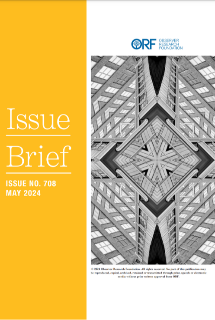
The prototypical supporters of far-right movements are often pictured to be angry white men. However, studies in Poland, Germany, Sweden and France indicate that women are increasingly drawn to far-right populist parties in Europe. The patriarchy and rampant misogyny embodied by right-wing groups like Generation Identity or Alternative für Deutschland (AfD) may lead many to believe that such groups alienate women rather than bring them into their fold, but contrary to popular belief, there has been a sharp increase in the number of female supporters of far-right movements and evidence suggests that the gender gap in far-right support is decreasing.
The rise in popularity of such groups amongst women despite them spewing rhetoric that undermines women poses a crucial question — why are women gravitating towards right-wing populist ideology? Often, women’s values in determining party support are viewed within a narrow lens of primarily ‘domestic issues.’ However, a 2016 study indicated that women aged between 18-40 years of age are most concerned about equal pay, equal opportunities in professional life and good quality childcare facilities. Studies also attribute fears of social exclusion and financial strain as important factors contributing to votes for right-wing populist parties.
In the last few decades, far-right parties have reframed their anti-feminist rhetoric by focusing on social issues through welfare-driven policy agendas.
One way in which these fears are addressed by right-wing populist groups is through strengthening their welfare systems. In the last few decades, far-right parties have reframed their anti-feminist rhetoric by focusing on social issues through welfare-driven policy agendas. The AfD election manifesto, for instance, aims to increase the birth-rate of the native population through measures that allow mothers to be paid a child allowance of € 25,000 in Germany. This pattern was mirrored in Poland where PiS — a right-wing conservative party — launched the Family 500+ initiative, guaranteeing families with two children a monthly payment of € 120 per child till they turn 18.
The adoption of these welfare schemes by right-wing parties to cater to women indicates the electoral importance of the female vote bank. Despite far-right populists’ conservative manifesto, about 25 percent of women cast their ballot in favour of the AfD in Germany during the 2017 parliamentary election. Additionally, more women than men voted for the ruling radical right-wing (PiS) party in Poland’s 2020 election. However, this pattern of seeking and securing the female vote has been a relatively recent occurrence. In the past, far-right groups have faced the brunt of alienating the female vote and they seemed to have learnt from their mistakes. This was echoed by Swedish alt-right influencer, Marcus Follin, who repeatedly referenced the narrow victory of the Green Party over the far-right Freedom Party in Austria due to support from female voters as a wakeup call for the far-right to awaken to the electoral importance of women. In a video titled “The Woman Question,” he told his followers, “you might not like that women have the right to vote, but it's about winning long-term political victory.” Thus, a double standard wherein the anti-woman rhetoric of such groups clashed against their electoral interests compelled them to find alternate strategies at gaining female support.
In the past, far-right groups have faced the brunt of alienating the female vote and they seemed to have learnt from their mistakes.
One such strategy was to tap into grievances of female blue-collar workers by using it as a conduit to further their anti-immigrant agenda. Since women have traditionally held dispensable part-time positions or worked in the informal sector wherein job security is low and competition with immigrants for limited resources is high, their grievances against immigration found takers within the far-right. As noted by Elisa Gutsche, researcher at Goethe Institute, “women sense they are at the lower rungs of society and find themselves having to compete against refugees and migrants.” This fear of losing out on job opportunities to immigrants dovetails with the anti-immigrant rhetoric of right-wing groups who, in turn, leverage these fears to heighten their allure and electoral prospects.
Along with leveraging women’s fear of immigrants taking their jobs, right-wing groups also spread unsubstantiated theories of immigrants being sole perpetrators of sexual violence. Women are targeted with the message that their safety will be compromised if immigrants — especially from Muslim countries — are let inside the borders. As Marine Le Pen, president of the National Rally in France, noted, “I am scared that the migrant crisis signals the beginning of the end of women’s rights.” This fear that Le Pen refers to is by no means restricted to France. In 2015, a series of sexual assaults in Cologne and Hamburg were attributed to immigrants without substantial evidence supporting this claim. Conversely, data showed that most cases of sexual violence in Germany were perpetrated by German men. Nonetheless, it is not data but persuasiveness of narrative that shapes public opinion; and right-wing groups leveraging fears of immigrants being sexual predators while also pegging themselves as the defenders of women rights has been a powerful narrative driving more recruitment of young white women.
It is not data but persuasiveness of narrative that shapes public opinion; and right-wing groups leveraging fears of immigrants being sexual predators while also pegging themselves as the defenders of women rights has been a powerful narrative.
Another strategy used by right-wing groups to pander to women relates to reframing the meaning of “feminism.” Researcher Laura Gordon references the fallacy of thinking about feminism as a coherent idea and it is this ability of feminism to be construed in different ways that helps the far-right’s agenda. Far-right groups try to sell the return to tradition gender roles as being a celebration of women empowerment, going against the progressive strand of feminist rhetoric. This celebration of traditional gender roles as a strong counter-cultural force to the feminism of the left was mirrored by the Sección Femenina — the woman branch of the right-wing Falange political movement in Spain. They promoted the “ideal woman” as being self-sacrificing and obedient and were seen by some women as a force of empowerment in the 1960s when they fought for legislation on female labour rights. More recently, with unregulated internet platforms like Gab becoming a vehicle for right-wing discourse, online communities like “Trad Wives,” that comprise roughly 30,000 women who reject feminism, has gained prominence. Such communities gaining female followers goes to show that the far-right has leveraged the discontentment of certain sections of women to further their agenda of broadening their spectrum of influence.
A key lesson to learn from the counter-intuitive nature of female support for the alt-right is that values determining party support cut across gendered lines. Women’s growing support for far-right populists offering contradictory manifestos is indicative of the importance laid by women on wider safety nets offering social security. Further, far-right populist groups are adopting the illusionary notion of “women’s rights” as discursive strategies to broaden their appeal. By deploying the anti-migration rhetoric to garner political support, gender and women’s rights are being instrumentalised to differentiate between “insiders” and “outsiders.” On the one hand, AfD defends the prohibition of the headscarf, viewing it as women’s submission to men, but on the other hand, it blames day-care facilities for harming the traditional family structure. Moreover, the group Generation Identity also spoke of increased female involvement but at the same time told recruiters to target young women in university as they are weak and vulnerable. This selective advocacy for women rights exposes not only the right-wing groups’ duplicity but also the rampant misogyny that pervades such groups. Thus, to curb the far-right’s misappropriation of feminist values and camouflaged ethnocentrism, it is key that the double standard and misogyny of these groups are effectively captured through counter-messaging.
The views expressed above belong to the author(s). ORF research and analyses now available on Telegram! Click here to access our curated content — blogs, longforms and interviews.




 PREV
PREV



